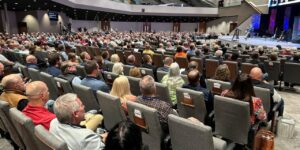
EDITOR’S NOTE: Jeff Iorg is president of Gateway Seminary of the Southern Baptist Convention.
ONTARIO, Calif. (BP) — Pressure turns fissures and flaws into chasms and canyons. Right now, some churches are discovering their past strategy of depending on donors instead of building stewards is producing devastating results.
Churches who depend on donors have a get-rich-quick mentality. They depend on fundraising, including frequent mass appeals to finance their ministry. These gifts often evaporate during difficult or crisis times. These churches often also ignore sound financial counsel, make questionable spending decisions, and find themselves unprepared for an economic downturn.
Churches who build stewards have a get-strong-slow perspective. They teach people to give, save and spend (yes, in that order) to develop financial strength over a lifetime. The convictions practiced as a result of stewardship development are the reason many families — across the economic strata — are weathering the current pandemic without panic. Churches full of these families are doing the same.
One benefit of a crisis is a forced re-examination of core strategies, methods and approaches — particularly the ways we manage money. One of my hopes is churches will come out of this crisis with a renewed commitment to teaching and practicing biblical stewardship. There are several good teaching programs available, so no church should use lack of educational resources as an excuse.
The reasons some leaders resist stewardship teaching are manifold. Two stand out. First, leaders know they can’t really teach what they don’t practice. Leaders, get your house in order on this issue. Second, many think stewardship development takes too long. True, it is not a quick fix. But it is the long-term solution to financial strength.
Get started now, and the results will start to show up in a year or two or three. This is time invested, not time wasted.















